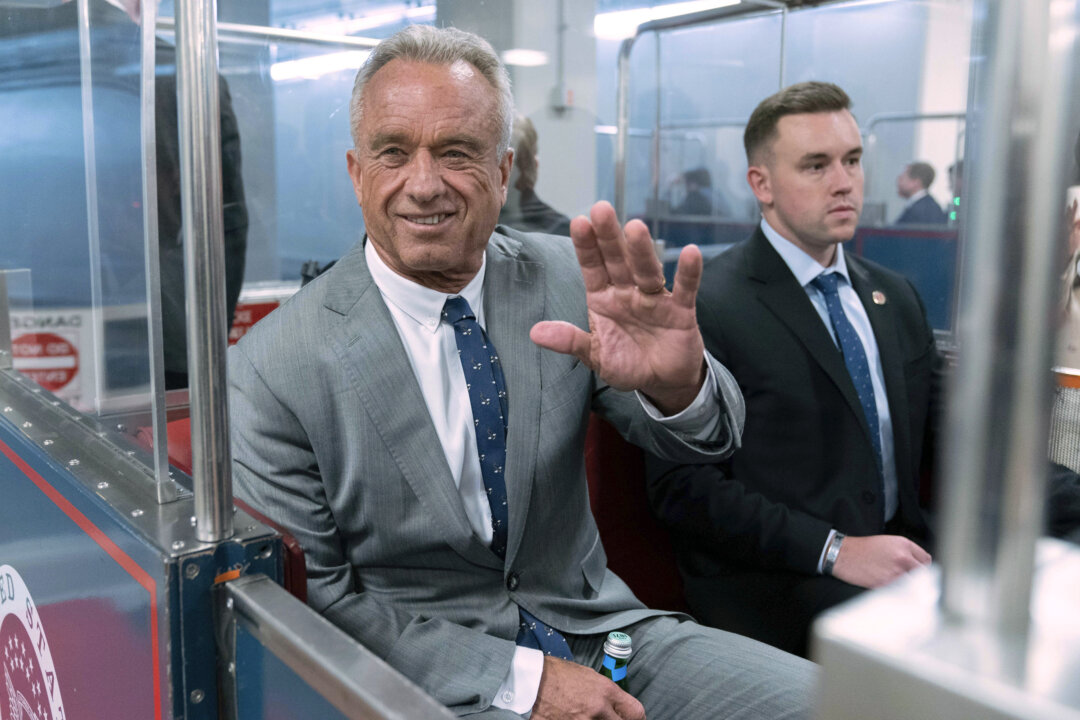A 53–47 vote along party lines moved Kennedy one step closer to becoming HHS secretary.
Robert F. Kennedy Jr.’s path to becoming secretary of the Department of Health and Human Services (HHS) received a significant boost on Feb. 12 when the Senate voted 53–47 to invoke cloture on his nomination for the post.
The decision was made hours after the chamber confirmed Tulsi Gabbard as director of national intelligence.
Cloture is a parliamentary procedure in the Senate to conclude debate on a proposal and move to a vote.
Kennedy ran for president as a Democrat and then as an independent before leaving the race on Aug. 23, 2024, and backing then-former President Donald Trump. He must get a simple majority to gain confirmation.
Republicans hold a 53–47 majority in the chamber. The full Senate vote is expected to happen on Feb. 13.
Kennedy appeared before the Senate Committee on Finance on Jan. 29 for his first confirmation hearing as Trump’s nominee for HHS secretary.
He was questioned by the Senate Committee on Health, Education, Labor, and Pensions on Jan. 30.
Last week, the Senate Finance Committee advanced his nomination to the Senate floor for a full vote with a 14–13 tally.
Sen. Bill Cassidy (R-La.) is a physician who said at the Senate Finance Committee’s confirmation hearing that he was “struggling” with supporting Kennedy because of the nominee’s stance on vaccines.
He was seen as a potential hurdle to Kennedy advancing out of the Senate Finance Committee, but ultimately, he cast a yes vote.
“If confirmed, I look forward to working together with Mr. Kennedy to achieve President Trump’s mission of improving the health of all Americans,” the Republican doctor said at the Senate Finance Committee’s vote.
Fighting chronic disease, improving children’s health, and addressing corporate influence on government agencies were vital parts of Kennedy’s stated presidential campaign platform.
If confirmed, he would head a department that manages 13 agencies, including the Centers for Disease Control and Prevention, the Food and Drug Administration, and the National Institutes of Health.
Kennedy has promised significant changes throughout the department and has vowed to address the nation’s chronic disease epidemic.

“The first thing I’ve done every morning for the past 20 years—is get on my knees and pray to God that He would put me in a position to end the chronic disease epidemic and to help America’s children,” Kennedy said last in August 2024, when he decided to leave the presidential race and support Trump.
Comments from lawmakers at the hearings, the Senate Finance Committee vote, and the Feb. 12 cloture showcased a sharp division between parties over Kennedy’s views.
Most Republicans praised Kennedy for his past advocacy work and his emphasis on addressing the nation’s chronic disease epidemic, while Democrats criticized the Children’s Health Defense founder for his stance on vaccine efficacy.
Kennedy has consistently said he is not anti-vaccine but rather an advocate for vaccine safety, informed consent, and nonpartisan studies of the efficacy of vaccines.
“I am pro-safety. I have worked for years to raise awareness about the mercury and toxic chemicals in fish, and no one called me anti-fish,” Kennedy said during his confirmation hearing before the Senate Finance Committee last month.
Sen. Ron Wyden (D-Ore.), ranking member of the Senate Finance Committee, has been a vocal critic of Kennedy. He has repeatedly urged lawmakers to not back the nominee. On Feb. 12, he reiterated those views, calling him a “uniquely unqualified nominee to become our nation’s chief health care officer.”
Wyden said: “Recent analysis showed that Mr. Kennedy has made 114 separate appearances in the last four years where he took anti-vaccine views or spread misinformation about the efficacy of the vaccines in 36 of these instances.
“Mr. Kennedy directly linked vaccines to autism, instead of providing the committee with clarity or reassurances about his decades-long career peddling of vaccine conspiracies.”
At the end of his remarks, Wyden said that Republicans “are going to regret voting if they do for Mr. Kennedy.”
Kennedy has repeatedly said he wants to make HHS “the gold standard of science.”
Sen. Steve Daines (R-Montana) echoed comments made by several Republican senators.
“I have found my engagements with you both behind closed doors in my office, as well as listening to you publicly, to be very thoughtful and science-based,” Daines said at the Senate Finance Committee hearing.

